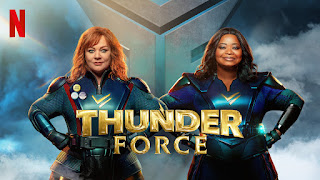Thunder Force is the second-best superhero movie to feature Seal's "Kiss from a Rose."
I'll try to keep this short. Spoilers ahead.
Everything about Netflix's "Thunder Force" feels half-baked, from the characters to the plot to the worldbuilding.
Brief synopsis: In a world where a freak event causes people with a predisposition to sociopathy to develop superpowers, kid genius Emily Stanton's (Octavia Spencer) scientist parents are killed in the crossfire. She moves schools and becomes friends with tough slacker Lydia Berman (Melissa McCarthy), but they have a falling out in college, and catch up around their 20-year high school reunion. Emily is now a wealthy buisnesswoman and scientist, who has developed a way to give superpowers to normal people, which Lydia stumbles into. Lydia ends up with super strength, and Emily gains the ability to turn invisible. Together they become Thunder Force, a team protecting Chicago from the super-powered Miscreants including Laser (Pom Klementieff) and The Crab (Jason Bateman), who are barely-secretly working for wealthy mayoral candidate The King (Bobby Cannavale) whose actual name I can't remember fifteen minutes after finishing the film.
Tonally, this movie is a mess. It feels like a knockoff superhero movie from twenty-plus years ago, like Sky High, but the subject matter and humor really don't feel kid-friendly, at least, not a lot of the time. There was a point where I remarked that it felt like The Mask, another comic book movie that didn't seem to really know who its audience was supposed to be.
The humor is all over the place. It vacillates between kid-friendly gross-out and slapstick, and apparently-improvised awkward humor that nearly always goes on too long, and shockingly few of the jokes actually land. Oh, and there's a joke about Melissa McCarthy (and later, Jason Bateman) only eating raw chicken that may be the first running gag I've seen where "gag" is intended literally.
We get a pretty good sense of Lydia's personality, but that may be because she's basically just the character Melissa McCarthy usually plays (not a knock on McCarthy so much as the roles she's cast into). Emily is less consistent; sometimes she's an irritable Vulcan, other times she's insisting that she's a fun person. She apologizes to her daughter (played by Taylor Mosby) for missing out on so much of her life, but we haven't actually seen that? If anything, she's felt more like a helicopter parent, and her daughter's expressed an inability to talk to her about normal teenage things. Other characters have a tendency to stay off-screen for long stretches, like Emily's assistant Allie, who does a third-act heel turn, and The King's political opponent Rachel Gonzalez (a thinly-veiled AOC stand-in) who is mentioned several times but doesn't actually appear until an hour into the film.
In a movie where your two leads have very different powers that reflect things about their personality, you'd expect that the plot would be designed around giving them both opportunities to use their powers in interesting ways. Instead, we have lots of opportunities for Lydia to do feats of super strength, while Emily mostly uses her invisibility while she's already hiding behind things. They even have to come up with a weapon for her—a supercharged taser—which requires her to become visible to use, so even in the one battle where she goes transparent, she pops in every time she hits someone.
It's a common problem with invisible characters: turning invisible is a neat power, but it's not very useful when you're doing superhero stuff. That's why characters with invisibility powers are either relegated to activities where such powers are useful (e.g., Invisible Kid) or have other abilities to make them more effective in combat. There's a reason that Lee & Kirby eventually gave Sue Storm the ability to make other objects invisible and create force fields. There's only so many times you can sneak around and tug Dr. Doom's cape. There's no reason why they couldn't have given Emily electric powers instead of a taser, which would have even tied into the "Thunder Force" name.
The villains' powers are no better. The King has super strength, but the scene where we first learn that doesn't actually make it clear what his ability is (he hugs a henchman to death). Laser's name and her first power usage suggests she shoots beams of energy that cut through things, but later she has more electrical powers, and...electro-telekinesis? The powers in this movie are so ill-defined that it feels like watching the Lester cut of Superman II.
The effects are generally fine, though when Octavia Spencer is shown invisible-but-visible-to-the-viewer, it's like they made no attempt whatsoever to make her look like she's actually on the set with anyone else. It's about what you'd expect from a CW show, with maybe a bit more budget.
It's not all bad. Taylor Mosby really steals the show, being an absolute delight in every scene she's in, and she gets to save the day in the end (even if it doesn't actually make sense how she could get super-powers). The super-powered villains are called "Miscreants," which I like, and which leads to probably the best recurring gag in the movie. There's a surprisingly decent soundtrack, including the aforementioned Seal song and a theme song for the movie featuring Scott Ian from Anthrax and Tina Guo from the Wonder Woman soundtrack.
But it's not enough to keep the movie from feeling like it was slapped together with a "good enough" attitude. It's not the worst superhero movie I've seen. It's not even the worst superhero movie I've seen in the last month (am I kidding? Am I exaggerating? I honestly have no idea). But it's not good, and it's not really worth the 106 minutes, even if it's basically free.


No comments:
Post a Comment